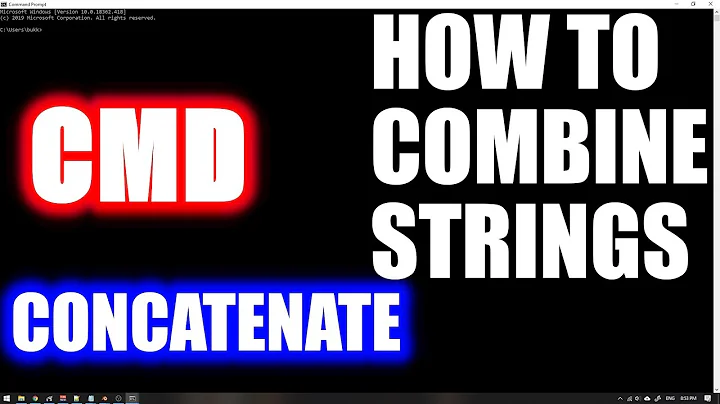How to concat string + i?
Solution 1
You can concatenate strings using strcat. If you plan on concatenating numbers as strings, you must first use num2str to convert the numbers to strings.
Also, strings can't be stored in a vector or matrix, so f must be defined as a cell array, and must be indexed using { and } (instead of normal round brackets).
f = cell(N, 1);
for i=1:N
f{i} = strcat('f', num2str(i));
end
Solution 2
For versions prior to R2014a...
One easy non-loop approach would be to use genvarname to create a cell array of strings:
>> N = 5;
>> f = genvarname(repmat({'f'}, 1, N), 'f')
f =
'f1' 'f2' 'f3' 'f4' 'f5'
For newer versions...
The function genvarname has been deprecated, so matlab.lang.makeUniqueStrings can be used instead in the following way to get the same output:
>> N = 5;
>> f = strrep(matlab.lang.makeUniqueStrings(repmat({'f'}, 1, N), 'f'), '_', '')
f =
1×5 cell array
'f1' 'f2' 'f3' 'f4' 'f5'
Solution 3
Let me add another solution:
>> N = 5;
>> f = cellstr(num2str((1:N)', 'f%d'))
f =
'f1'
'f2'
'f3'
'f4'
'f5'
If N is more than two digits long (>= 10), you will start getting extra spaces. Add a call to strtrim(f) to get rid of them.
As a bonus, there is an undocumented built-in function sprintfc which nicely returns a cell arrays of strings:
>> N = 10;
>> f = sprintfc('f%d', 1:N)
f =
'f1' 'f2' 'f3' 'f4' 'f5' 'f6' 'f7' 'f8' 'f9' 'f10'
Solution 4
Using sprintf was already proposed by ldueck in a comment, but I think this is worth being an answer:
f(i) = sprintf('f%d', i);
This is in my opinion the most readable solution and also gives some nice flexibility (i.e. when you want to round a float value, use something like %.2f).
Solution 5
according to this it looks like you have to set "N" before trying to use it and it looks like it needs to be an int not string? Don't know much bout MatLab but just what i gathered from that site..hope it helps :)
Related videos on Youtube
simpatico
Author of dp4j.jar, which lets you test access private methods in Java without writing any reflection API code. The necessary reflection code is injected by dp4j at compile-time. So you only write: @Test public void aTest(){ PrivateConstructor pc = new PrivateConstructor("Hello!"); Instead of: import java.lang.reflect.*; @Test public void aTest() throws IllegalAccessException, NoSuchMethodException , InvocationTargetException, InstantiationException { Constructor pcInit = PrivateConstructor.class.getDeclaredConstructor(String.class); pcInit.setAccessible(true); PrivateConstructor pc = (PrivateConstructor) pcInit.newInstance("Hello!"); Check it out at www.dp4j.com
Updated on October 02, 2020Comments
-
simpatico over 3 years
for i=1:N f(i) = 'f'+i; endgives an error in MatLab. What's the correct syntax to initialize an array with N strings of the pattern fi?
It seems like even this is not working:
for i=1:4 f(i) = 'f'; end-
gnovice over 12 yearsExactly what do you want the array
fto look like? A single string with all of the individualfistrings concatenated together? A character array with one string per row? A cell array ? -
bonanza over 5 yearsFor recent version of MATLB, use strings. For example
"asd" + (1:5)works then.
-
-
telenachos over 12 yearsSomething like "f(i) = sprintf('%s%d', f, i);" would work as well.
-
simpatico over 12 yearsmy issue was the lacking use of curly brackets to index
-
Mansoor Siddiqui over 12 yearsThis is actually a great solution. I wasn't aware of
genvarname. -
Oli over 12 years
['f', num2str(i)]is a bit shorter. -
 Czechnology over 6 yearsFYI:
Czechnology over 6 yearsFYI:genvarnameis deprecated.









